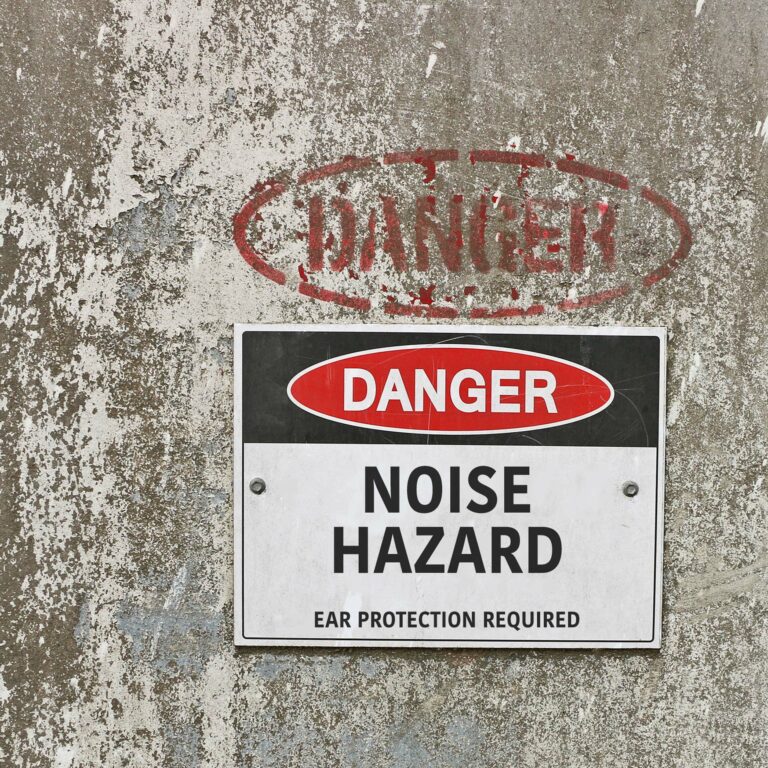In a noise-filled world where bustling cities echo with the constant hum of traffic, construction, and technology, we often find ourselves immersed in a medley of city noise. However, getting used to the constant loud noise can leave us unaware of the potential dangers of continuous exposure to loud noise. This is where occupational hearing loss comes into play—a silent but significant threat that gradually impairs our hearing and communication abilities.
Occupational hearing loss happens when people are exposed to excessive noise or ototoxic (harmful to the ear) substances at work. These exposures can harm our sensitive auditory system, resulting in several hearing problems. The consequences go beyond the job, affecting our quality of life, mental health, and safety.
With this widespread problem, knowing how important it is to protect your hearing at work is more essential than ever. By knowing what causes occupational hearing loss, its signs, and how to avoid it, we can protect our hearing health and make our workplaces safer and more pleasant.
What Is Occupational Hearing Loss
Occupational hearing loss is a common condition that arises from prolonged exposure to loud noise and ototoxic chemicals in the workplace
When we are subjected to hazardous noise levels exceeding 85 A-weighted decibels (dBA), our delicate auditory system becomes vulnerable to damage. This damage primarily affects the hair cells within the inner ear, which are responsible for transmitting sound signals to the brain. Over time, the cumulative effect of loud noise exposure leads to a gradual decline in hearing ability, impairing our capacity to perceive and comprehend sounds accurately.
Ototoxic substances increase the danger of hearing loss caused by noise. These chemicals can affect various parts of the ear, making them more vulnerable to the damaging effects of noise. In diverse occupational settings, it’s estimated that around 10 million people are exposed to ototoxicants such as solvents. The combination of loud noise and chemical exposure increases the risk of hearing loss and tinnitus, which is the sense of buzzing, rushing, or ringing sounds in the ears.
Causes of Industrial Hearing Loss
- Ototoxic chemicals: Certain substances encountered in the workplace, such as solvents, metals, pharmaceuticals, and pesticides, can be toxic to the auditory system and cause hearing loss.
- Traumatic noise events: Sudden and intense noises, like explosions or gunshots, can result in immediate and severe damage to hearing.
- Age-related factors: The natural aging process can contribute to hearing loss, and when combined with occupational noise exposure, it can accelerate the decline in hearing ability.
- Cumulative exposure: Repeated exposure to moderate noise levels over a prolonged period can lead to cumulative damage to the hearing.
- Exposure to loud noise: Prolonged exposure to high decibel levels can damage the delicate structures of the inner ear, potentially developing noise-induced hearing loss.
While there are different types of hearing loss, certain occupations are more prone to develop noise-induced hearing loss.
Noise-induced hearing loss (NIHL) is a condition that occurs due to prolonged exposure to loud sounds, causing damage to the delicate hair cells in the inner ear. Symptoms of NIHL include:
- Tinnitus
- Difficulty hearing high-pitched sounds
- Muffled hearing
- A feeling of fullness in the ears.
Symptoms of Occupational Hearing Loss
Experiencing hearing loss in the workplace can significantly impact an individual’s daily life. Recognizing the symptoms is crucial in identifying potential hearing loss and taking appropriate action. Here are some common signs and indicators to watch for:
- Difficulty hearing in noisy environments: One of the initial signs of occupational hearing loss is struggling to listen and understand conversations in environments with background noise. It may indicate hearing loss if you find it increasingly challenging to follow conversations or distinguish speech from competing sounds.
- Perception of mumbling or the need to ask for repetition: People with occupational hearing loss often perceive others as mumbling or speaking unclearly. You may frequently ask others to repeat what they said or seek clarification, even in relatively quiet settings. This difficulty in understanding speech is a common symptom of hearing loss.
- Other people are noticing: In some cases, individuals with hearing loss may not immediately see the changes in their own hearing abilities. Often, the people closest to them—family members, friends, or colleagues—notice the signs of hearing loss first. They may observe the affected individual’s increased reliance on volume control, frequent requests for repetition, or social withdrawal due to communication challenges.
Do Hearing Aids Help Prevent Further Hearing Loss?
No, wearing hearing aids won’t stop the progression of hearing loss. Their main purpose is to help you hear better and understand sounds more clearly rather than preventing further decline in your hearing ability.
However, there’s an important thing to know about how hearing loss can affect your brain. Having untreated hearing loss for a long time can cause auditory deprivation, which means your brain doesn’t get enough stimulation from sounds. This can lead to permanent damage in the part of your brain that processes sound, and unfortunately, hearing aids can’t reverse this damage.
Simply put, if you don’t use your brain’s hearing center regularly, it can lose some of its ability to process speech and other sounds, even if you later start using hearing aids. That’s why addressing hearing loss as soon as you notice it is crucial. If you think you might have hearing loss, it’s a good idea to get a comprehensive hearing exam from a professional who can assess your situation and recommend the right treatment options.
While hearing aids can’t stop hearing loss, they play a vital role in managing the impact of hearing loss and improving your daily life. By amplifying and clarifying sounds, hearing aids can enhance your communication, help you stay engaged with your surroundings, and contribute to your overall well-being. So, even though they can’t prevent further hearing loss, they are a valuable tool in managing the effects of hearing loss and improving your quality of life. Seeking professional evaluation is crucial to ensure the best solution for your level of hearing loss.
Workplace Hearing Safety Guidelines
Hearing loss is a serious concern in the workplace that affects many workers. To ensure a safe and healthy work environment, it’s crucial to prevent hearing loss and prioritize hearing safety actively. By following some key guidelines, we can protect our hearing and maintain our well-being on the job.
Measure and Control Noise Levels
First and foremost, it’s important to measure and control noise levels in the workplace. Employers should regularly assess the noise exposure levels to identify areas with hazardous noise. This helps implement effective measures to reduce noise, such as soundproofing or modifying equipment. By controlling noise at its source, we can significantly minimize the risk of hearing damage.
Establishing Hearing Loss Prevention Programs
Creating comprehensive hearing loss prevention programs is essential. These programs should include training sessions that raise awareness about the risks of noise exposure and educate workers on the proper use of hearing protection devices. It’s important to emphasize the importance of consistently and correctly using protective equipment to maximize its effectiveness.
Promote Regular Hearing Checks
Annual hearing tests should be conducted for workers who are exposed to hazardous noise or ototoxic chemicals. These tests help detect any changes in hearing ability and allow for early intervention if needed. By monitoring workers’ hearing health over time, employers can take proactive steps to address potential issues and ensure appropriate measures are in place to protect employees’ hearing.
Encourage Open Communication
Effective communication plays a vital role in hearing safety. Employers should foster an environment where workers feel comfortable reporting any concerns or symptoms related to hearing loss. Regularly engaging in discussions about hearing safety and providing opportunities for feedback can help identify potential issues and address them promptly.
Protect and Enhance Your Hearing with Great Hearing Benefits
At Great Hearing Benefits, we are committed to assisting individuals in managing occupational hearing loss through our comprehensive hearing service plans. We aim to provide the necessary support and guidance to enhance hearing health and overall well-being.
With our tailored benefits, we offer a range of services, including hearing evaluations, annual hearing tests, and coverage for hearing aids and repairs. We work closely with employers and employees to develop customized strategies and programs that promote hearing safety in the workplace. Our experienced professionals are dedicated to helping individuals find suitable hearing aid solutions by considering lifestyle, budget, and specific hearing needs.
Employers and employees can access the resources and solutions needed to protect and enhance their hearing by partnering with Great Hearing Benefits. Let’s prioritize hearing health and create a thriving work environment where individuals benefit from comprehensive hearing services. Contact us today to learn how we can assist you in managing occupational hearing loss effectively.


